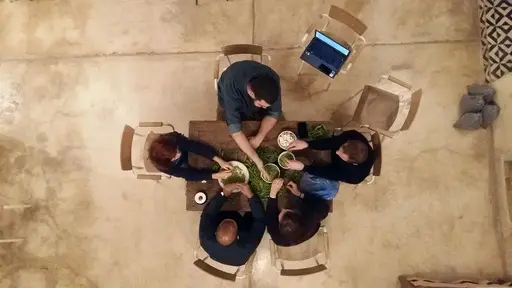
QANAT
Join us at BAK, basis voor actuele kunst, Utrecht on Sunday 15th December 2019 for a lecture and collective dinner with the collaborative platform QANAT.Buy tickets (via Eventbrite) | Facebook event
In the lecture Time for a Break(down): Reimagining Social Flows in the Not-Yet, A. George Bajalia introduces QANAT’s practice and theoretical framework, deepening into the platform’s relation to the politics and poetics of water infrastructure in Morocco. The potential of moments frequently considered parasitical or pointless as vessels for temporal and temporary socialities, solidarities, and communities, is explored through an exercise of concerted listening. Rather than aspiring to utopian political forms, George Bajalia deepens into how breakdowns in liquid, resource, and human flow have the potentiality to provide grounds for unearthing modes of relating to one another under the condition of system failure.
Before the lecture, there is a common dinner during which some of the questions and results shared during the Training for the Underwater(ed) Land are addressed. While eating together, further food for thought is brought to the table to speculate on what is worth bringing with us and what is worth leaving behind on the deserted island pool party of the post-apocalyptic Not-Yet present and underwater(ed) future.
The event is the culmination of Training XXI: Training for the Underwater(ed) Land, taking place from the 11–15 December 2019 as part of Trainings for the Not-Yet (14 September 2019 – 12 January 2020).Tickets (via Eventbrite):€10 regular | €7.50 student discountTickets include dinner by the Basic Activist Kitchen.
Free places: For each training, BAK provides a few free places for those who would otherwise not be able to attend. To apply, please send a short explanation (max. 120 words) to olga@bakonline.org, at least four days prior to the training. (First come, first serve)
George Bajalia is Ph.D Candidate in the Department of Anthropology at Columbia University. His research and artistic interests intersect in the borderland narratives of northern Morocco, and the social, linguistic, and political formations that emerge through time spent waiting at borders. He is co-founder of mobile arts lab Borderline Theatre Project, a theatre and media partnership promoting transnational collaboration in the performing arts across the Middle East and North Africa. With BTP, he directs the annual Youmein Creative Media Festival in Tangier, Morocco (2015–20), as well as the Northwestern University in Qatar Creative Media Festival (2018–20). His films include With Rugs Unfurled: The Social Life of a Moroccan Rug (2017) and Multi Meets Poly: Multiculturalism and Polyculturalism go on a first date (2014).
19 February 2023, 14.00
Mi or Mie in Bahasa Indonesia means “noodles,” while mi in Chinese can mean “rice.” These over-indulgences of critical carbs are the workout diet for the Ultracirculation study group. Now in Yogyakarta, Critical Circulation Mi invites listeners into a guided soundscape with aurations by KUNCI Study Forum and Collective, School for Improper Education, Elaine W. Ho, and Wan Ing Que. While eating, listening, and reading, fieldwork-in-progress looking into the so-called “undocumented period” of the New Order Regime will be broadcast and unfolded in collaboration with participants in SOIE.
Community Portal
15 February 2023, 10.00-18.00
A series of practical publishing workshops hosted by an active squat and anarchist social center in Amsterdam and organized by the Bookbinding Studio of Sandberg Instituut/Rietveld Academy and Lila Athanasiadou.
Community Portal
4 February 2023, 13.00-18.00
Using the sancocho (a pan-Latin American soup with no fixed recipe) as a tool for research and encounter, Mercado Lourdes (Bogotá, Colombia) will host and organize a series of field meals. These events activate and connect the multiple affects that have resulted from ongoing research with local producers into the biodiversity of the territory.
Community Portal
16 December 2022, 15.00-17.00
In all continents, people have built matriarchal cosmologies sustained by complex rituals. In the advent of main modern religions and after centuries of colonizing invasions, the goddesses of antiquity were suppressed by the patriarchal structures that consolidated our era. However, they found ways to speak to us in the language of patterns, melodies, and poems. This workshop uses the voice as a method to reveal the presence of goddesses.
Community Portal
Long-Term ProjectPropositions for Non-Fascist Living